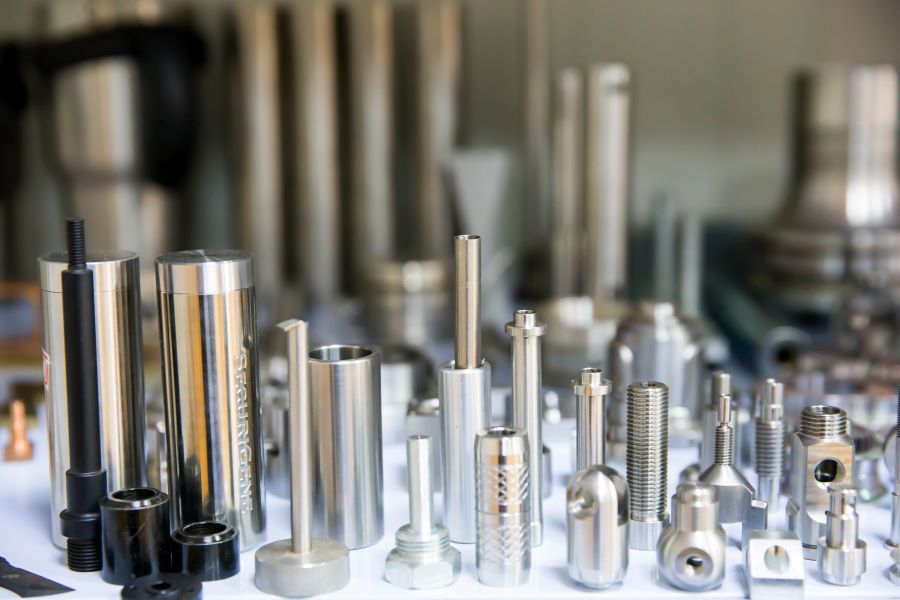- Time:2024/10/18 Posted:Dongguan Quality Innovation And Technology Co.,Ltd
In the realm of modern manufacturing, precision is not just a goal—it's a necessity. CNC (Computer Numerical Control) turning parts have become a cornerstone of precision engineering, offering an innovative solution for a wide range of applications across various industries. From aerospace to automotive, CNC turning is transforming the way components are designed and produced, ensuring exceptional quality and efficiency. In this blog, we’ll delve into the innovative features of CNC turning parts and how they revolutionize precision engineering.

1. Precision at Its Core: The Art of CNC Turning
CNC turning is renowned for its ability to produce components with remarkable accuracy. Utilizing computer-controlled machines, this process rotates a workpiece against a cutting tool, allowing for intricate designs and precise measurements.
Key Features:
Tight Tolerances: CNC turning can achieve tolerances as tight as ±0.001 inches, making it ideal for applications that demand precision, such as aerospace components and medical devices.
Consistent Reproducibility: With CNC technology, every part produced is identical, reducing the risk of defects and ensuring that each component meets stringent quality standards.
This level of precision is essential in industries where performance and safety are non-negotiable.
2. Versatility in Materials: Adapting to Your Needs
One of the standout features of CNC turning parts is their versatility. CNC machines can handle a wide variety of materials, including metals, plastics, and composites, making it suitable for diverse applications.
Key Features:
Material Variety: Whether it's aluminum, steel, titanium, or various plastics, CNC turning can accommodate a range of materials to suit your project needs.
Custom Finishes: The machining process can also achieve different surface finishes, from polished to anodized, enhancing both the aesthetic and functional qualities of the parts.
This adaptability enables manufacturers to create tailored solutions that meet specific project requirements without compromising quality.
3. Efficiency and Speed: Accelerating Production Times
In today’s fast-paced manufacturing environment, efficiency is key. CNC turning parts streamline production processes, drastically reducing lead times without sacrificing quality.
Key Features:
Rapid Production: CNC machines can operate continuously, producing high volumes of parts in a short amount of time, which is critical for meeting tight deadlines.
Quick Changeovers: With advanced programming capabilities, CNC turning machines can easily switch between different projects, minimizing downtime and enhancing productivity.
These efficiency gains not only improve output but also lower production costs, providing a competitive edge in the marketplace.
4. Customization: Tailored Solutions for Unique Challenges
Every project presents unique challenges, and CNC turning excels at providing customized solutions. The flexibility of CNC technology allows for the creation of bespoke parts tailored to specific requirements.
Key Features:
Complex Geometries: CNC turning can produce intricate designs, including threads, grooves, and profiles, which are often required for specialized applications.
Prototyping: The ability to quickly produce prototypes enables manufacturers to test and refine designs before full-scale production, ensuring that the final product meets all specifications.
This level of customization empowers businesses to innovate and adapt to changing market demands.
5. Cost-Effectiveness: Maximizing Your Investment
While investing in CNC turning technology may seem substantial, the long-term benefits are significant. The efficiency and precision offered by CNC turning translate into lower costs and increased profitability.
Key Features:
Reduced Material Waste: The accuracy of CNC turning minimizes scrap and rework, contributing to more cost-effective production processes.
Lower Labor Costs: Automation reduces the need for extensive manual labor, allowing skilled workers to focus on more complex tasks.
By optimizing costs and enhancing productivity, CNC turning provides excellent return on investment.
6. Quality Assurance: Upholding Industry Standards
Quality control is a vital aspect of CNC turning. Manufacturers implement rigorous quality assurance protocols to ensure that every part meets industry standards and customer expectations.
Key Features:
In-House Inspection: Many CNC turning facilities are equipped with advanced measuring equipment to verify dimensions and tolerances, ensuring each component's integrity.
Certification Compliance: Many CNC turning services hold certifications for industry standards, guaranteeing that their processes adhere to regulatory requirements.
These measures instill confidence in customers, knowing they are receiving top-quality components.
7. Innovative Technology: Staying Ahead in Manufacturing
CNC turning is not just about precision; it’s also about leveraging advanced technology. The integration of automation, data analytics, and IoT in CNC turning machines is revolutionizing how parts are manufactured.
Key Features:
Smart Manufacturing: Advanced sensors monitor machine performance in real-time, enabling predictive maintenance and reducing unexpected downtime.
Data Analytics: The ability to collect and analyze production data helps manufacturers optimize processes, enhance quality control, and make informed decisions.
By adopting these technological advancements, manufacturers can stay competitive in a rapidly evolving landscape.
8. Applications Across Industries: Supporting Diverse Needs
CNC turning parts are employed in a vast array of industries, demonstrating their versatility and reliability. From medical devices to automotive components, CNC turning meets the unique demands of various sectors.
Key Applications:
Aerospace: Precision parts for aircraft and spacecraft that must meet rigorous safety and performance standards.
Automotive: Custom components for engines, transmissions, and other critical systems that require durability and efficiency.
Medical: Specialized parts for medical devices and equipment, where accuracy and reliability are paramount.
This broad spectrum of applications underscores the importance of CNC turning in driving innovation and efficiency across industries.
Conclusion
CNC turning parts are revolutionizing precision engineering through their innovative features and unmatched capabilities. With a focus on precision, versatility, efficiency, and customization, CNC turning is setting new standards in the manufacturing landscape. As industries continue to evolve, the demand for high-quality, tailored solutions will only increase, making CNC turning an essential component of modern manufacturing.
Investing in CNC turning technology not only enhances your production capabilities but also positions your business for long-term success in a competitive market. Whether you need complex components for aerospace or custom parts for consumer products, CNC turning delivers the precision and quality that modern engineering demands.
